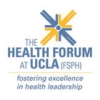Health Forum: “Health and Medical Care in Jails and Prisons: A Local, State, and National Challenge: A panel discussion”
|by Zita Dixon| Wednesday, January 29th 2014
Dr. Gary Filerman , president of Atlas Health Foundation, moderated the Health Forum on “Health and Medical Care in Jails and Prisons: A Local, State, and National Challenge: A panel discussion”. The Health Forum audience got an overview on California county jail health care and mental health quality improvement strategies and challenges.

Dr. Renee Kanan discussed the implications of overcrowding and decision to realign state prisons to counties in California. At California Correction Health Care Services , Dr. Kanan is dedicated to using the Triple Aim process to with her healthcare management initiatives and gave an overview of her quality management measures. Dr. Kanan and Dr. Mark Malek , Director of Infection Control for LA County Sheriff’s Department and Adjunct Assistant Professor at FSPH, gave a historical and legal history of healthcare access to incarcerated individuals. They also outlined the impact of the Affordable Care Act (ACA) on the incarcerated and the jail and prison systems budgets. ACA allows for incarcerated people to access MediCal and defray the costs for the state. This has been activated in 25 states (including California) to date. The impact of this policy may reduce recidivism since healthcare access after release is the one of the most powerful factors of recidivism.
Dr. Malek outlined the basics of criminal justice 101 with regards to the difference between jails and prisons, disproportionality of Blacks and Hispanics incarcerated compared to Whites, and the lifelong incapacitation of incarcerated people (~70% recidivism) and their children (6 to 7 times more likely to be incarcerated if they (or if one has) have incarcerated parents). Dr. Malek drilled down on the population health concerns for inmate health and the partnership in the LA County Jail with DPH, UCLA, and USC HIV Corrections Fellowship to find creative solutions to the health disparities faced by inmates.
Dr. Simpson, Staff psychiatrist for LA County Jail Mental Health Services and Clinical Assistant Professor at USC’s Keck School of Medicine, outlined the challenges with correctional mental health services which include employee morale, collaboration challenges, overcrowding, and ineffective discharge/release planning due to early (and sometimes random) release dates and times. Dr. Simpson said, “I have been working for 16 months on the front lines and I am still unclear on how release planning works.”
During the Q & A, a lively discussion ensued on issues of research limitations and inter–disciplinary collaborations. An audience member raised the point that research on this population is a challenge due to the legal protections monitored by Institutional Review Boards to protect incarcerated individuals from exploitation. A FSPH alum, Miriam Ha, asked for an internal committee to provide healthcare and mental health providers cross-training on how to better serve their patients.
The next Health Forum will take place on Wednesday, February 26th on “Drugs and Pharmaceuticals in 2014: What's Ahead for the Industry, Patients, and Payers”.
Visit FSPH Page for more information.
